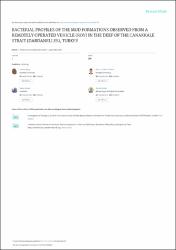Bacterial profiles of the mud formations observed from a remotely operated vehicle (rov) in the deep of the Canakkale strait (dardanelles), Turkey

Göster/
Erişim
info:eu-repo/semantics/openAccessTarih
2019Yazar
Aline, GülşenTüretken, Pelin Saliha Çiftçi
Gürun, Sevan
Kalkan, Samet
Taşova, Yunus Emre
Özyalvaç, Mustafa
Üst veri
Tüm öğe kaydını gösterKünye
Aline, G., Türetken, P.S.Ç., Gürun, S., Kalkan, S., Taşova, Y.E: & Özyalvaç, M. (2019). BACTERIAL PROFILES OF THE MUD FORMATIONS OBSERVED FROM A REMOTELY OPERATED VEHICLE (ROV) IN THE DEEP OF THE CANAKKALE STRAIT (DARDANELLES), TURKEY. Fresenius Environmental Bulletin, 28(9), 6389-6399.Özet
The Canakkale Strait, as a part of the Turkish Strait System (TTS), is an important water route in the world which connects the Mediterranean Sea to the Sea of Marmara and hence to the Black Sea via the Istanbul Strait. Due to its peculiar hydrodynamic characteristics, the area offers unique opportunities for researching profiles of bacteria under different, poorly described conditions. the samples of the mud formations, observed by "Remotely-Operated Vehicles" (ROV) with a diameter of roughly 120m and a height of 1.5-2m at a depth of 24m on the seabed of the canakkale Strait, were investigated regarding bacterial composition, metabolic characteristics of heterotrophic bacteria and environmental variables. Gram-negative fermenting and non-fermenting bacteria were the most common group in terms of species numbers, compared to Gram-positive cocci and non-spore-forming and sporeforming bacilli, both also found in the sample of mud formations and surface sediment around them. in the study, four species, Micrococcus lylae, Lysinibacillus fusiformis, Bordetella trematum and Roseomonas gilardii were recorded for the first time in the Turkish Seas. the results of the study contribute to an increasing knowledge on bacterial diversity and bacterial interactions regarding metabolically-talented bacteria and the environmental conditions of different texture on the floor of the seabed.

















